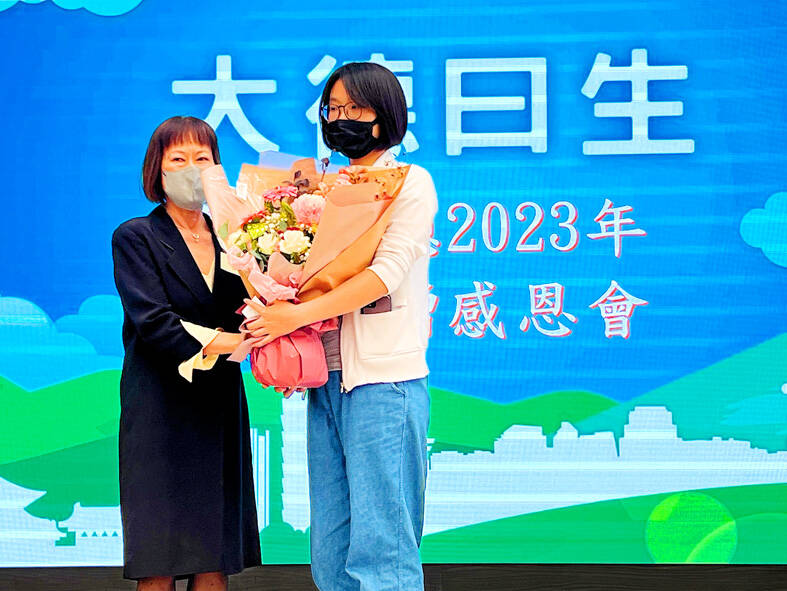Doctors yesterday said they were hopeful that organ donations would stabilize and rise to exceed 300 people, after donor numbers fell during the COVID-19 pandemic.
The Taiwan Organ Registry and Sharing Center said that in 2021 and last year, the height of the COVID-19 pandemic in Taiwan, organs were donated from 290 and 305 people respectively, down from 396 in 2020.
Lin Niang-cheng (林釀呈), a doctor in Taipei Veterans General Hospital’s transplant surgery department said that fewer organ donations were a result of COVID-19 restrictions.

Photo: CNA
The number of donors from June to July 2021 dropped to single digits, compared with the 20 to 30 people per month in previous years, Lin said.
Kidneys, livers and other organs, aside from lungs, can safely be transplanted from people who died of COVID-19, he said.
The main body part being donated in Taiwan is the cornea, while about 100 to 120 livers, kidneys, hearts and pancreases are donated per year, he said.
About 10,000 people every year need organ transplants, 8,300 of whom are waiting on kidney transplants, Lin said.
In the past few years, the government has started allowing the donation of kidneys from people who died of heart attacks, if the person had signed a donor agreement before their death, he said.
At an event hosted by Taipei Veterans General Hospital yesterday, recipients and the families of organ donors over the past three years were invited to share their stories.
A woman surnamed Cheng (鄭) said that her parents had been involved in a car accident two years ago, and that her mother was the beneficiary of bone graft surgery.
Her father sustained severe spinal injuries and was declared clinically brain dead even after efforts to save him, she said.
Cheng signed the agreement form to donate her father’s liver, kidneys, pancreas, corneas, skin, bones, tendons and ligaments, which went on to benefit eight families, she said.
Her father, who was an air-conditioner repairman, always used functioning parts from discarded air-conditioners to repair other units, she said, adding that her father would have been happy to know that his organs had helped others.
A woman surnamed Kao (高) talked about her 64-year-old father, who died after a car accident in July.
His organs benefited five families, she said.
Kao said her family had been unanimous in donating his organs, and her uncle said he would sponsor a music concert in commemoration of his younger brother, her father.
She said she signed an organ donor card on Father’s Day this year as a way of commemorating her father.
Separately, Chi Mei Hospital held a similar event yesterday, commemorating organ donors and promoting organ donation.
Tian Yu-feng, a surgeon at Chi Mei Hospital, said that the pandemic had caused a sharp decline in the number of people willing to donate their organs and led to the unfortunate deaths of many people who were waiting for organ transplants.
He said he hoped the event would not only express the hospital’s gratitude to donors and their families, but also hopes that their donations would inspire others to do the same to help others have a chance at a new life, Tian said.
Additional reporting by Wu Chun-feng

The CIA has a message for Chinese government officials worried about their place in Chinese President Xi Jinping’s (習近平) government: Come work with us. The agency released two Mandarin-language videos on social media on Thursday inviting disgruntled officials to contact the CIA. The recruitment videos posted on YouTube and X racked up more than 5 million views combined in their first day. The outreach comes as CIA Director John Ratcliffe has vowed to boost the agency’s use of intelligence from human sources and its focus on China, which has recently targeted US officials with its own espionage operations. The videos are “aimed at

STEADFAST FRIEND: The bills encourage increased Taiwan-US engagement and address China’s distortion of UN Resolution 2758 to isolate Taiwan internationally The Presidential Office yesterday thanked the US House of Representatives for unanimously passing two Taiwan-related bills highlighting its solid support for Taiwan’s democracy and global participation, and for deepening bilateral relations. One of the bills, the Taiwan Assurance Implementation Act, requires the US Department of State to periodically review its guidelines for engagement with Taiwan, and report to the US Congress on the guidelines and plans to lift self-imposed limitations on US-Taiwan engagement. The other bill is the Taiwan International Solidarity Act, which clarifies that UN Resolution 2758 does not address the issue of the representation of Taiwan or its people in

US Indo-Pacific Commander Admiral Samuel Paparo on Friday expressed concern over the rate at which China is diversifying its military exercises, the Financial Times (FT) reported on Saturday. “The rates of change on the depth and breadth of their exercises is the one non-linear effect that I’ve seen in the last year that wakes me up at night or keeps me up at night,” Paparo was quoted by FT as saying while attending the annual Sedona Forum at the McCain Institute in Arizona. Paparo also expressed concern over the speed with which China was expanding its military. While the US

SHIFT: Taiwan’s better-than-expected first-quarter GDP and signs of weakness in the US have driven global capital back to emerging markets, the central bank head said The central bank yesterday blamed market speculation for the steep rise in the local currency, and urged exporters and financial institutions to stay calm and stop panic sell-offs to avoid hurting their own profitability. The nation’s top monetary policymaker said that it would step in, if necessary, to maintain order and stability in the foreign exchange market. The remarks came as the NT dollar yesterday closed up NT$0.919 to NT$30.145 against the US dollar in Taipei trading, after rising as high as NT$29.59 in intraday trading. The local currency has surged 5.85 percent against the greenback over the past two sessions, central